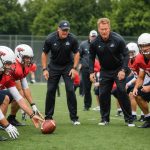Understanding the Importance of Sleep for Athletic Recovery
The importance of sleep in athletic recovery cannot be overstated. It’s not just about feeling refreshed; it’s crucial for optimal performance improvement. During sleep, muscles undergo repair, and energy stores are replenished, processes vital for athletes after strenuous activity.
Numerous physiological activities occur during sleep. The body ramps up the production of growth hormones, essential for muscle repair and athletic recovery. Furthermore, the immune system is fortified, reducing the risk of illness that can hinder training schedules.
In parallel : Unlocking Vertical Leap: Proven Strategies for Volleyball Players to Boost Jump Height
Statistics reveal alarming effects of sleep deprivation on athletes. Studies show that chronic lack of sleep can decrease strength, impair reaction times, and slow recovery, drastically affecting an athlete’s performance and career. Athletes with poor sleep are more prone to injuries and take longer to heal compared to their well-rested peers.
How does sleep impact mental prowess? Cognitive functions like decision-making, focus, and memory consolidation are enhanced with quality sleep. For athletes, these functions directly translate into performance, from tactical decisions in games to executing complex skills.
This might interest you : Massage guns: effective tools for workout recovery and muscle relief
Understanding and prioritising the importance of sleep is essential for athletes who aspire to achieve their best. Integrating healthy sleep habits can significantly enhance both physical recovery and mental sharpness, paving the way for consistent performance improvement.
Evidence-Based Sleep Techniques for Enhanced Recovery
Effective sleep techniques are integral to recovery strategies for athletes. Implementing evidence-based methods can significantly enhance both physical and mental recovery.
Establishing a Consistent Sleep Schedule
A regular sleep routine is vital. It helps maintain energy levels, optimise performance, and prevent injuries. Circadian rhythms play a critical role; they dictate our body’s natural sleep-wake cycle. Consistency in sleep times helps align these rhythms, enhancing sleep quality. Athletes should adjust sleep schedules gradually across training cycles to adapt seamlessly.
Creating an Optimal Sleep Environment
Several factors contribute to a sleep-conducive environment. Focus on:
- Bedding: Choose comfortable materials.
- Room Temperature: Maintain a cool ambiance, ideally between 60-67°F.
- Light Control: Use blackout curtains to minimise light exposure.
Reducing noise and distractions also improves sleep quality. Consider earplugs or white noise machines for a serene environment.
Pre-Sleep Rituals for Improved Sleep Quality
Establishing a calming bedtime routine can lead to better sleep. Limit screen time and stimulating activities at least an hour before bed. Instead, engage in relaxation techniques like meditation or deep breathing exercises. These strategies signal the brain that it’s time to wind down, promoting a restful transition to sleep.
Sleep Duration Recommendations for Athletes
Athletes are frequently recommended to prioritise adequate sleep duration to enhance performance and recovery time. Sleep needs can vary based on the type of sport and training intensity. Generally, it is advised that athletes get between 7 to 9 hours of sleep each night. Certain groups, such as endurance athletes or those undergoing rigorous training, might find benefits in extending sleep duration beyond this range.
Individual Variations Based on Training Intensity
Recovery time is highly dependent on the intensity of an athlete’s training regimen. Those engaging in highly demanding sports may require longer sleep periods to facilitate optimum recovery. This is crucial because well-rested athletes perform better, experience less fatigue, and reduce injury risk.
Sleep Cycles and Their Contribution to Recovery
Understanding sleep cycles is vital for enhancing an athlete’s recovery. Each cycle, consisting of REM and non-REM stages, plays a role in physical and mental recuperation. Non-REM sleep, particularly, is known for its restorative effect on the muscles, while REM sleep supports cognitive functions and emotional balance. Hence, acknowledging how these cycles aid in recovery can help athletes optimise their sleep needs and improve overall health and performance.
Timing Strategies for Sleep and Training
Effective sleep timing can significantly impact athletic performance and recovery. Aligning sleep with a training schedule is crucial to maximizing benefits from workouts. Scheduling sleep appropriately around workouts ensures the body is primed for both exertion and recovery.
Aligning Sleep with Training Sessions
When should you sleep for optimal performance? It is recommended to sleep at least 7-9 hours before a workout. This maximizes energy levels and mental focus. If your training session is in the evening, a short nap in the afternoon might be beneficial. Naps can aid short-term recovery, allowing you to sustain high-performance levels. Ideal sleep windows should align with your body’s circadian rhythm, typically falling between 10 PM and 6 AM. Prioritizing full nightly sleep around your schedule helps in building a consistent routine.
Post-Workout Sleep and Recovery
Post-exercise sleep is essential for muscle recovery optimization. It assists in muscle repair and adaptation by facilitating protein synthesis and hormone balance. Studies suggest the body experiences maximal recovery when sleep follows within two hours after intense training. For different exercise types, adapt sleep duration accordingly—endurance training may necessitate longer sleep for adequate restoration. Prioritizing post-training sleep ensures effective physical and cognitive recovery, enhancing subsequent performance potential.
Physiological Benefits of Sleep on Performance
Sleep is a powerful tool for performance enhancement due to its numerous physiological benefits. During sleep, the body undergoes crucial hormonal changes that significantly affect recovery. Growth hormone, which plays a pivotal role in repairing tissues and building muscle, is predominantly secreted during deep sleep stages. This hormonal boost accelerates sleep recovery, allowing for faster healing and improvement in overall physical performance.
Beyond the physical realm, quality sleep enhances cognitive functions such as focus and decision-making. Sleep enables the brain to process and store memories, resulting in improved concentration and quicker reaction times. This cognitive sharpness is essential for athletes who rely heavily on strategic planning and split-second decisions.
In the long run, consistent and quality sleep contributes positively to an athlete’s health. It strengthens the immune system, reduces the risk of injury, and mitigates stress levels. Moreover, sleep deficiency can compromise these physiological benefits, leading to diminished performance and increased vulnerability to health issues. Thus, understanding and harnessing the full spectrum of sleep’s physiological benefits can propel athletic success and ensure sustained performance excellence.
Insights from Athletes and Experts
Gleaning athlete insights into the role of sleep reveals fascinating tales from their personal journey. Many athletes stress the undeniable link between restful sleep and peak performance. For instance, personal anecdotes often highlight how crucial a consistent sleep schedule has been in enhancing their stamina during competitions.
Moving to expert advice, sports scientists and coaches continuously emphasise strategic sleep interventions. Experts suggest that maintaining a dark, quiet sleeping environment can significantly elevate an athlete’s recovery rate. Feedback from seasoned professionals accentuates the value of consistency in sleep routines. They stress on using tools like sleep tracking to pinpoint patterns that might hinder rest. Performance stories of athletes breaking personal bests underscore the transformative impact of these strategies.
Additionally, sports scientists dedicate themselves to deeper exploration of sleep’s impact on recovery, proposing several practical recommendations. They advise integrating short naps into daily routines, particularly after intense training sessions, to facilitate quicker recovery. Most compelling, perhaps, are the tales of athletes who revamped their careers by adapting their sleep habits, thus achieving unparalleled sporting feats. Athletes and experts alike cherish the notion that sleep is not merely a component but rather a cornerstone of sustained athletic success.











